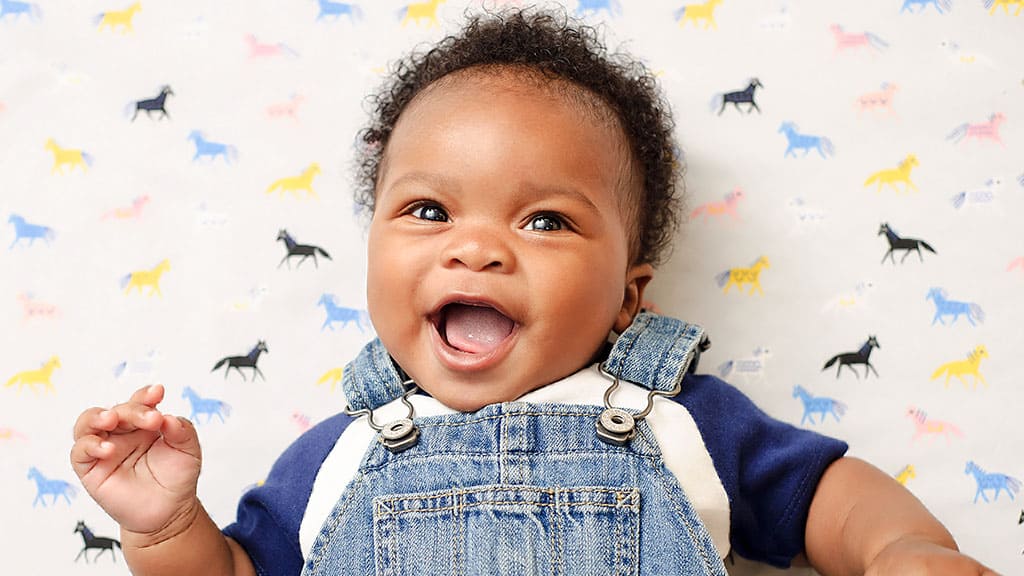
Table of Contents
A 7-month-old baby is all set to explore, learn, observe, and laugh it all out this month. Expect the little one to grow muscles as they now begin to sit without support and also their brain to develop and improve.
Not only that, make sure you baby-proof your house if not already, and keep away the choking hazards as the little explorers begin to get on their fours this month. With this increase in movement and them developing new skills that require a lot of energy, the 7 months old baby will have an increased appetite. To know what else you can expect from your baby’s development pace this month and how you can make sure of the good care, read on as Parenthood Bliss has it all sorted in detail, just for you!
Your 7-month-old baby milestones and growth
1. Sleeping hours and patterns
Expect your baby to sleep about 11 hours at night and two quick naps up to three to four hours during the day. Nevertheless, due to the changes in the baby’s body, there are chances for your toddler to have a rather disruptive sleep. Try co-sleeping at this time to help cater to the needs of the little one.
2. Feeding requirements
At 7 months of age keeping in mind, the baby’s development must consume around 24 to 30 ounces of breastmilk/formula in a 24 hours period. Additionally, they must also have 4 to 9 tablespoons of cereal, a fruit, or a vegetable with 6 tablespoons of foods containing protein.
3. Your 7-month-old baby's weight
The average weight of a 7-month-old baby girl is 16.14 pounds and 18.5 for baby boys. In case you observe the weight to be more or even less, consult your doctor as they would ask you to increase the feed or provide you with an alternative.
4. Your baby's bowel movements
A 7-month old baby’s development in terms of bowel movements is nothing less than a storm. In no time you will see the infant switching from tummy to a sitting position and then crawl, scoot or creep. However, if your baby isn’t doing it all this month do not be stressed as this could be a result of them not having enough tummy time. Perhaps, try to place their favorite toy in front of them and ask your baby to try and get it, this will help enhance the urge of crawling. Otherwise, make sure to consult the doctor.
What to expect from your 7-month-old baby's doctor visit?
There are no doctor visits this month for the baby, but there are a lot of changes that are taking place in the little one’s health that parents must be aware of or observe. Listed below are a few:
1. Food allergies
This occurs in the baby’s first-year when their bodies’ immune system is rather in a weak state. The symptoms that you must look for in this case are hives, skin rashes, sneezing, vomiting, and trouble while breathing after being exposed to the food.
2. Cough
A cough is of two kinds, one ‘wet’ and the other ‘dry.’ The wet coughing involves mucus due to the cold with symptoms like sore throat, runny or stuffy nose, sneezing, headaches, and/or a mild fever. On the other hand, the latter is when there is no mucus and is caused by the smoke of tobacco.
Tip: In order to avoid the cold, make sure to install a baby humidifier instead. This will help avoid germs and keep the babies healthy and fit.
3. Baby hives
This is an allergic reaction that is observed to be red in color with raised bumps on the baby’s skin. In fact, in a few cases, they also have a pale center that clusters in an area. Therefore, parents must observe the baby’s eating habits in a journal to keep an account of the culprit and avoid the same in the future.
Taking care of your 7-month-old baby: Quick tips and tricks
In their 7 months, the babies start to build onto their strengths and spend more time learning and observing things from their surroundings, use a high-chair, and inculcate new skills. It is especially an add-on job for the parents to make sure of the baby development ratio keeping in mind the little one’s health. To help you with a few common one’s, here is a quick guide for:
1. Your baby's first clap
As and when the 7-month-old baby begins to learn and get their tiny hands together to clap, it’s worth a celebration. Why? This development in the child indicated their ability to develop hand-eye coordination with fine-motor skills.
During this time, it is important for you to sing praises and cheer back the little one even if they do the same things quite often, this helps boost the baby and encourage them to learn more activities. They can now play games with you, build social skills, and also observe the language.
2. Your baby's need for more iron intake
As they now begin to crawl, sit, make sounds, and hold objects or toys, the little children will reach out for more food as all these activities require certain amounts of energy. This is why it is important for you to make sure that your baby is getting enough iron from the formula and solids from baby cereals they are now eating or drinking.
These iron-fortified foods are included for a reason, this vital role includes the production of hemoglobin, which is a protein in the red blood cells that helps carry oxygen throughout the body and resulting in the development of the brain, motor skills, and memory.
Therefore, as per the American Academy of Pediatrics, babies must have around 11 milligrams of iron in a day. You can do so by offering iron-fortified formula or cereal and foods rich in iron, such as meat, chicken, fish, eggs, avocado, broccoli, and spinach.
Postpartum changes and pro tips
As the kids grow, it is only natural for the parents to get a little worried about their baby’s health and safety. Here are a few things that you can do to help lift a kilo off your head.
1. It is ok to ask for help
We understand that as new parents you may feel that very things related to your baby need to be taken care of by you individually and it’s ok to do so too. However, one must remember that we are perhaps mere humans and it’s only natural for the parents to get a little worked up and tired with cleaning, preparing food, storing milk, etc.
This is why you must never be shy to ask for help and it does a sign of your unworthiness. Try to contact your friends, family members, and even your partner for help while you can take some rest and catch fresh air. On the other hand, you could hire a caregiver or a babysitter from a licensed website.
2. Baby-proofing
As mentioned earlier, with the baby’s first moves every household thing turns into a no-zone as there is an added danger of the little one putting everything in their mouth. This could include anything from drawers to cabinets, to cleaning supplies.
- Perhaps, it is only safe and a good option for parents to make sure that the house is baby-proofed and the poisonous things are kept out of reach. These safety measures will help you take less trouble in terms of the safety of the little baby in their 7th-month exploration.
- Will you be at it, make sure to also install baby gates for stairs and doors too.
Is the 7-months old baby allowed to drink water now?
With all the development and the preparation to crawl and acquire new skills, the little one might at this age start to grow and be dehydrated. This is also because they fail to store in liquid, are in high-temperature zones, and lose some when vomiting.
Therefore, if they have started with soft solids, it is recommended to give them little water along with their meal in the favorite sippy cup to reduce the risk of dehydration. Also, remember to not fill the cup to its rim as it could cause choking in the baby.






